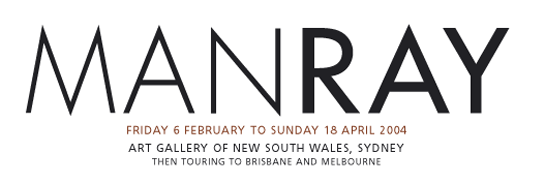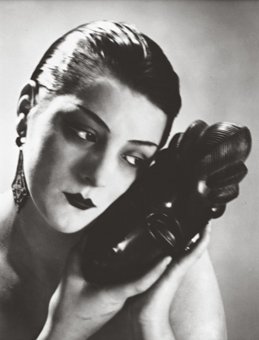

ManRay was one of the most famous and original artists of the 20th century; his importance and influence have many aspects. He revolutionised photography through his experiments and then popularised these through his work as a portrait and fashion photographer. Man Ray's iconic images such as Noire et Blanche, Le Violon d'Ingres and haunting portraits of his many friends and colleagues are now embedded within popular consciousness.
This is the first monographic exhibition of his work in Australia and is organised by the Art Gallery of New South Wales. After showing in Sydney, the exhibition tours to Brisbane and Melbourne. Ninety percent of the 200 works in the exhibition are from 1917-39, the remainder from 1940-70, reflecting the great years of Man Ray's photographic output and his resolve from 1940 onwards to concentrate on painting.
The majority of the photographs are vintage and a number of them have never been published. Three quarters of the works are from the collection of Lucien Treillard, Paris, who was Man Ray's assistant in the last years of the artist's life, and one quarter from MNAM, Centre Pompidou, Paris. The exhibition is co-curated by Judy Annear, Senior Curator Photography at the Art Gallery of New South Wales and Emmanuelle de L'Ecotais, Curator of Photography at the Mus�e d'Art Moderne de la Ville de Paris.
The 200 works are divided into 9 sections - New York & Duchamp, Films, Fashion, Portraits, Nudes, Objects, Rayographs, Landscapes and Documents. The three largest sections - Nudes, Objects and Portraits are broken down into smaller subsections: Portraits is grouped around specific subjects and their roles and Nudes are grouped according to specific narratives and models. All sections are organised chronologically and thematically.
Man Ray was a superb technician and a highly inventive artist. He always denied that he had any ability with the camera or in the darkroom; however it is clear that there are many variations from a specific shoot or from his darkroom manipulations and rarely one final image. This exhibition emphasises his techniques of framing, cropping, solarising and use of the photogram in order to present a new, 'surreal' way of seeing, which continues to fascinate because of the lush and enigmatic beauty of the finished work.
EXHIBITION EVENTS
FREE LUNCHTIME LECTURE SERIES
Fridays 1pm
5 March. Dr Ann Elias Surreal encounters in Man Ray's photography
12 March. Alison Gwilt Man Ray: Fashion and the Surreal
19 March. Dr Vicki Karaminas Disembodied visions: Man Ray's nudes
2 April. Terence Maloon Chinks in the Armory Show: Man Ray, Duchamp & New York Dada
EXHIBITION TALKS
Thursdays 3pm
12 February. Judy Annear, Curator
19 February. Anne Ferran, Artist
26 February. Eric Matthews, Editor, Belle Magazine
4 March. Justene Williams, Artist
GUIDED TOURS
Tuesdays, Thursdays & Sundays 12 noon
ART AFTER HOURS
Talks
Wednesdays 6.30pm, 3 - 24 March
The spotlight of the popular Art After Hours programme will fall on Man Ray for four Wednesday evenings during March. Well-known speakers will illuminate elements of the artist's surreal vision by exploring themes including his muses, modernism, technology and fashion.
THE MAN RAY FILM SERIES
Wednesdays 2.30pm & 7.15pm, Sundays 2.30pm
25 February - 4 April
Cinema enjoyed high artistic status in France in the 1920s. Audiences were equally receptive to French and foreign films and a network of specialist cinemas and film clubs was ready to show innovative and risky work. A significant overlap existed between film and the fine arts and this paved the way for the photographer Man Ray to express his roving curiosity and genius for experimentation in the medium of moving images. By the end of the 1920s he was a leading figure of avant-garde cinema.
Typically, a screening of a Man Ray film in 1920s Paris would be as part of a broader programme of experimental work, seen among narrative feature films and documentaries made by other filmmakers. The Man Ray Film Series at the Art Gallery of New South Wales presents his work in the same way. Man Ray's experimental shorts are juxtaposed with such diverse classics as L'Age d'Or (dir: Luis Bu�uel 1930), The Blue Angel (dir: Josef von Sternberg 1930), A Girl in Every Port (dir: Howard Hawks 1928), L'Atalante (dir: Jean Vigo 1934) and La Zone (dir: Georges Lacombe 1928).
|